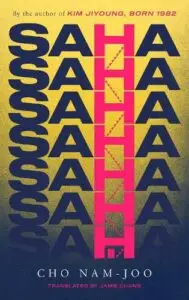Saha is a dystopian novel set on a fictitious Korean island called Town. The island is completely corporatised. Everything is run by a company, from education to health to the government. To survive in Town, you have to be a good corporate citizen. It is the sort of utopia someone like Elon Musk or Gina Rinehart would idolise.
The story is set around an abandoned housing tower complex, Saha, which is now inhabited by dispossessed squatters. They have set up their own power source, a well for water, and a vegetable garden. The authorities tolerate them as they can be used for menial labour. But they have no access to any services, like medical, social security, or educational services. Charities don’t exist. The squatters are classified as non-citizens who are left to fend for themselves.
In an episodic fashion, the novel tells the story of the inhabitants of Saha. It begins with Do-Kyung waking and vomiting and then finding Su dead in a car. We are not told what has happened as he flees. But the novel is not a mystery. It is an examination of the lives of people who have been abandoned by a totally corporatised society. A society, from what I have read, that South Korea is not far from in reality.
Some of the characters have deformities, like the one-eyed Sara. Some are fleeing persecution. One is used for medical experimentation. Many of them have secrets. All of them hope for a better life. All of them hope to one day become citizens of Town.
Saha is a novel that questions how the less fortunate are treated in society and where neoliberalism is taking us. This could be the Western world of the near future. It is probably close to the China of the present. It is a brutal novel that could devastate a reader who is yet to realise how harmful and uncaring capitalism is.
I found the writing good, but a bit stilted to begin with. I think the style of writing emphasises the uncaring nature of the society and how the novel’s characters are unable to participate in it.
I enjoyed the novel and will look up more of Cho Nam-Joo’s writing. I cared about the characters and what happened to them. I recommend this book to readers with a social conscience.
[Spoiler alert] The ending is ambiguous. I took it to mean that the characters find no one to attack or blame for their plight, just a faceless corporation.

